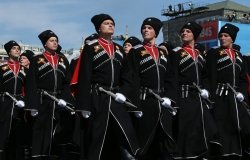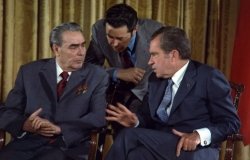Japan and Russia: Strategic Positioning in East Asia
"The Irkutsk summit meeting in March 2001 between Prime Minister Yoshiro Mori and President Vladimir Putin marked a new height in Japan-Russian relations after perestroika," stated Kazuhiko Togo, Lecturer, Department of East Asian Studies, Princeton University, and former Ambassador of Japan to the Netherlands at an 18 January 2005 lecture at the Kennan Institute.
Relations between Japan and Russia had been improving for some years leading up to the meeting, according to Togo. The Japanese government had worked to improve economic relations with Russia, and was the third largest contributor of aid to Russia, providing $6.5 billion during the 1990s. Most notably, Togo continued, Japan's Prime Minister Ryutaro Hashimoto invited Russia to join APEC (Asia Pacific Economic Cooperation) in 1997. Japan's initiative, Togo contended, played a major role in paving the way for Russia to become a member of this regional organization.
Even as overall relations improved, Togo noted, territorial issues remained a constant irritant between Russia and Japan. At the close of WWII, the Soviet Union seized four islands from Japan. Russia maintains control over them to this day, and there is still no official peace treaty concluding WWII between Russia and Japan. At the Irkutsk meeting, according to Togo, Prime Minister Mori proposed parallel negotiations to settle the dispute over the islands. The first track would begin with the Soviet Union's 1956 offer to return the two smaller islands to Japan upon concluding a peace treaty. The second track would focus on the fate of the two larger islands. It was Mori's hope, Togo explained, that parallel negotiations would help resolve both tracks.
While there seemed to have been certain prospects for progress after the Irkutsk meeting, little was accomplished over the following four years. President Putin's scheduled visit to Japan in 2005 may be reason for hope in regaining dynamism in the negotiations, Togo said.
"When you talk about geopolitics in East Asia after the Cold War," Togo stated, "the most conspicuous factor to address is the rapid rise of China. It is on the mind of leaders in Russia and Japan." Togo noted that Russia and China have had held thirteen summits dating back to 1989, signing three major agreements: normalizing relations in 1989; declaring a strategic partnership in 1996; and a Treaty of Friendship in 2001. Russia is China's largest supplier, and China is Russia's largest customer, for weapons. "Russia and China have many positions in common," observed Togo, listing additional issues such as terrorism, U.S. missile defense, and Iraq.
China's rapid rise has serious implications for Japan as well. Although political relations are poor at present, Togo explained, China has grown from Japan's fourth largest trading partner in 2000 to its largest partner in 2004. Even as the economic relations between the two nations grow, there remain a number of issues of concern. They include disputes over the East China Sea and lingering Chinese resentments over Japan's actions in WWII. In addition, there has been growing sympathy in Japan for Taiwan, and China has objected to policy manifestations of that sympathy, such as Japan's issuing a visa to Taiwan's former President Lee Teng-hui.
Russia and China may enjoy strong relations now, Togo continued, but as China's power grows, good relations with Japan may be of strategic interest for Russia. Togo cited the example of Russia's planned oil pipeline from the Irkutsk region to Asia. In late 2002, Japan expressed serious interest in building the pipeline to the Russian east coast port of Nakhodka, later shifted to Perevoznaia. Previously, there had been serious negotiations between Russia and China for a shorter pipeline to be built to the Chinese city of Daqing. On December 31st of last year, Togo noted, the Russian government took another step towards deciding in favor of a pipeline from Taishet, near Irkutsk, to Perevoznaia.
Togo suggested that Russia's decision was based on Japan's expressed interest in helping to finance the pipeline and on Russia's desire to diversify its potential export market beyond China. According to Togo, Japan's interest stems from its policy of seeking diversity in oil supplies. Following the oil crisis in the 1970s, Japan reduced its oil dependency on Middle East oil from 80 to 70 percent of supply. However, Togo stated, Japan's dependency on Middle East oil has now climbed back to nearly 90 percent of supply. Although overcoming political difficulty with China is in Japan's deep national interest, Togo added, improved relations with Russia could re-enforce Japan's strategic position.
Internally, Togo noted, President Putin and Prime Minister Koizumi remain strong, popular leaders able to capitalize on their popularity to enact tough decisions. The strength of Putin and Koizumi and shared strategic interests bode well for Japan-Russian relations. "It should be possible," Togo concluded, "to find some breakthrough on the territorial issue and to bring up our relations to meet the strategic requirement of the time. Whether our two governments will have the wisdom or intuition to get to this breakthrough remains to be seen."
About the Author


Kennan Institute
The Kennan Institute is the premier US center for advanced research on Eurasia and the oldest and largest regional program at the Woodrow Wilson International Center for Scholars. The Kennan Institute is committed to improving American understanding of Russia, Ukraine, Central Asia, the South Caucasus, and the surrounding region though research and exchange. Read more











